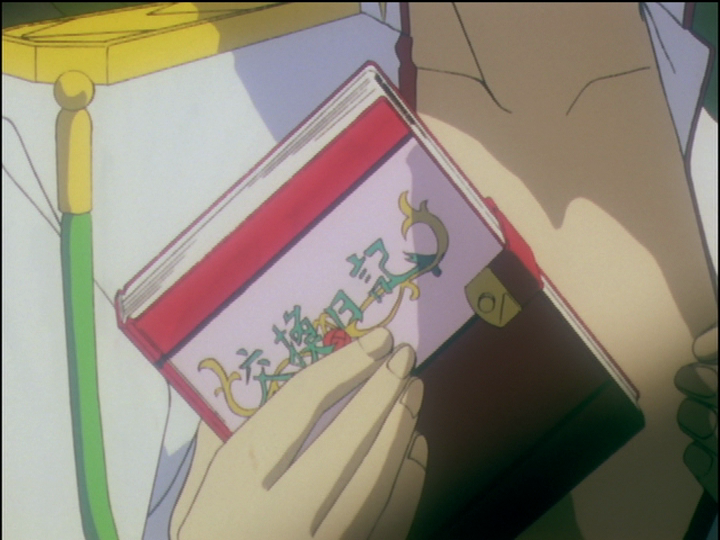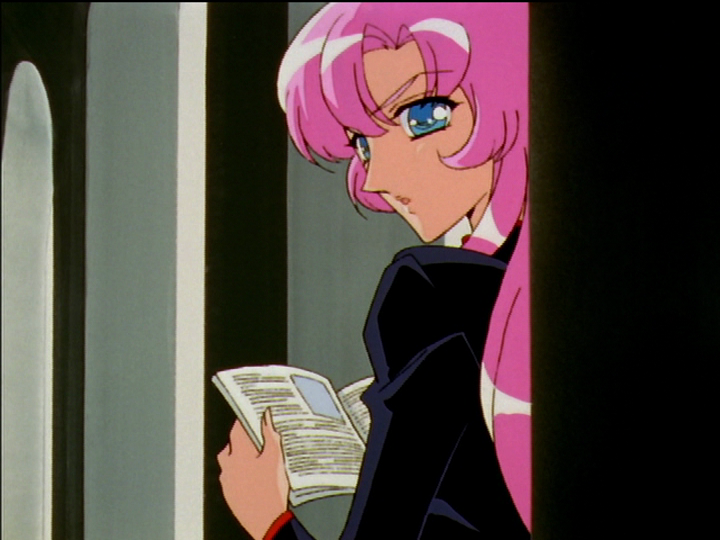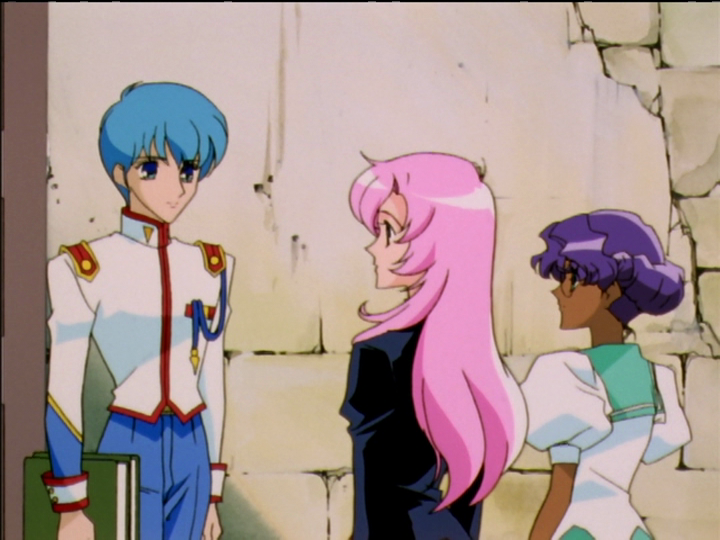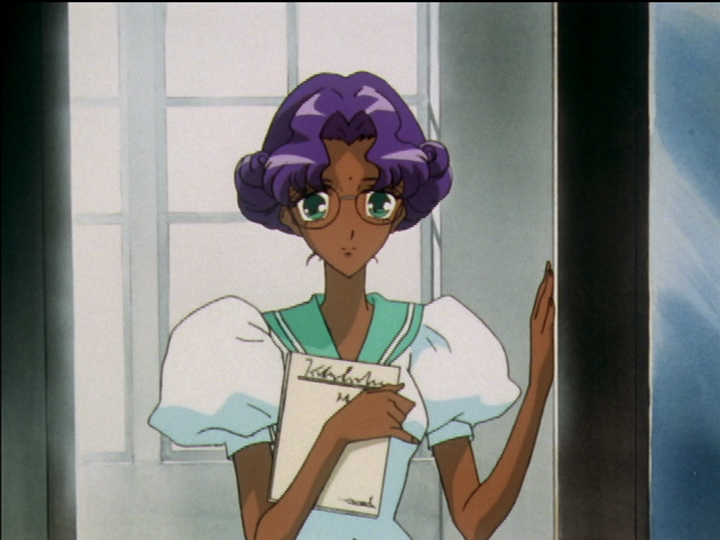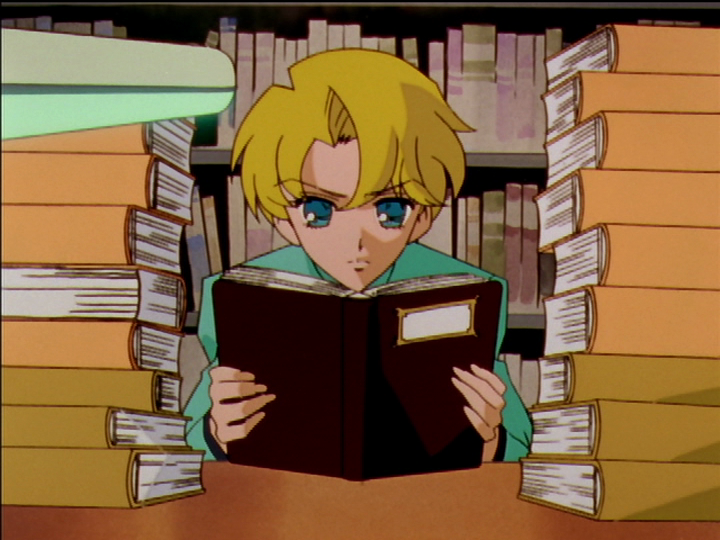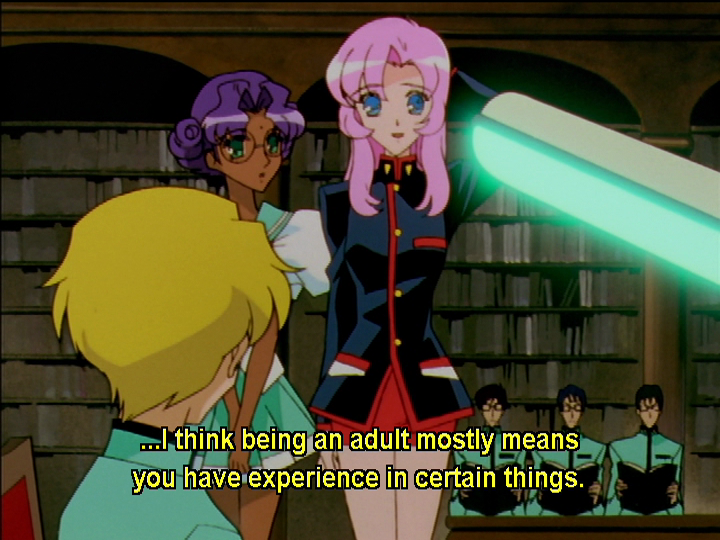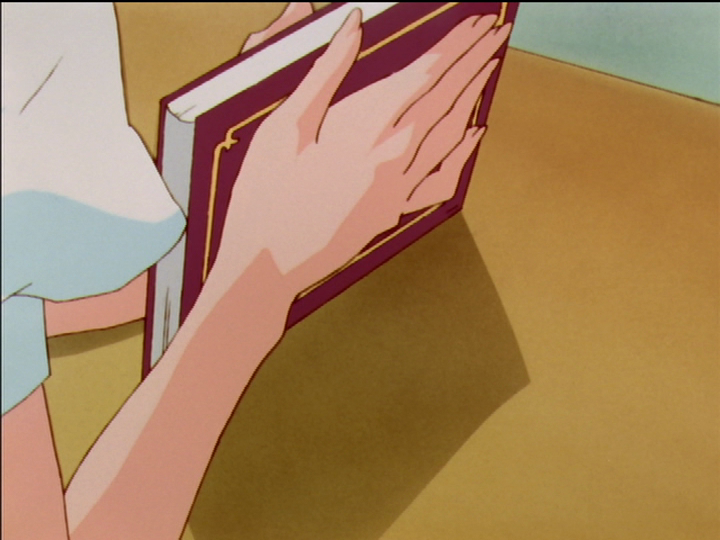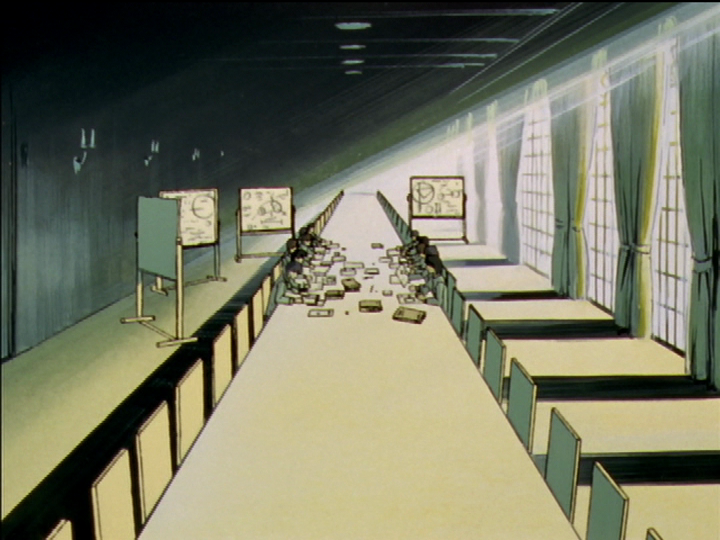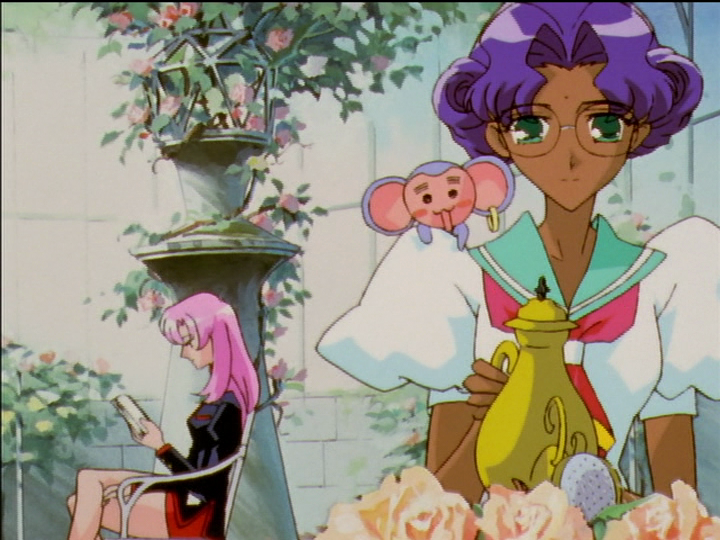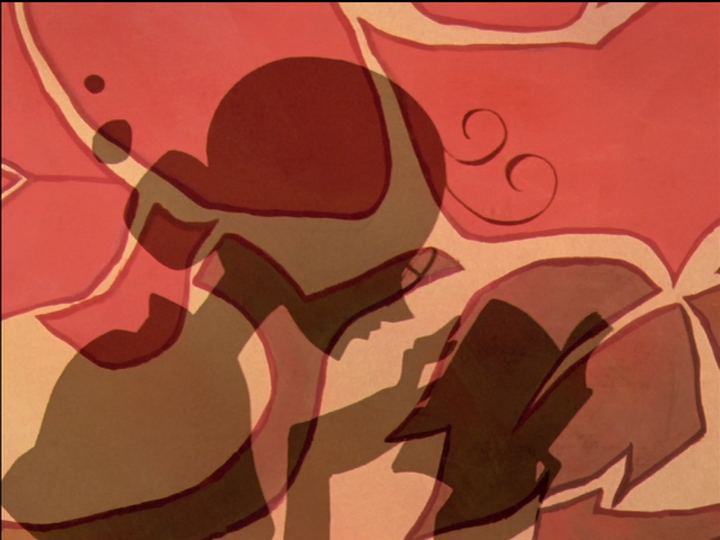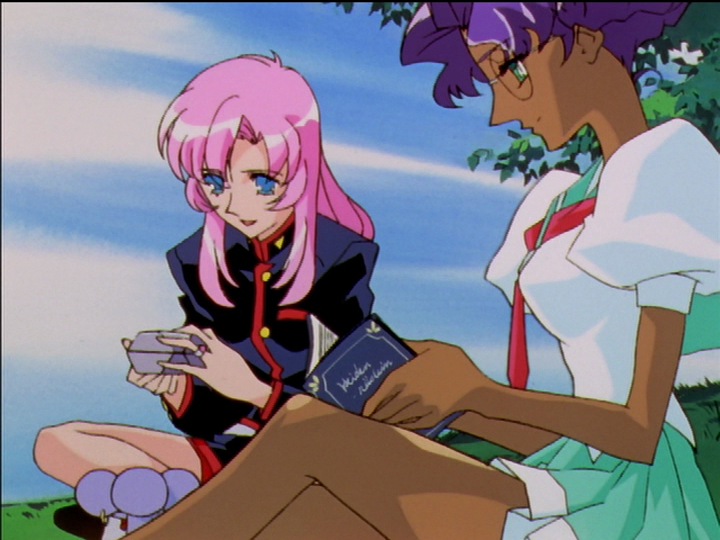Utena - book catalog
For some reason I had the impression that books were uncommon in Utena. It’s not so. My question has become: Why are there so many books? Is Utena flaunting its erudition?
Books are particularly many in the Black Rose, in keeping with the arc’s intellectual theme.
For most of the Student Council meeting of episode 1, Miki writes in his notebook without looking up, even when he speaks. He is shaken by Saionji’s control over the Rose Bride, and he does not look up; Juri teases him for it and he does not look up. Is he concealing his emotions with work, or distracting himself from his emotions with work? Either way, it is not successful.
The notebook is green and black and bears a rose crest. Presumably it is sold in the school store. Miki writes with a pencil.
In episode 3 we don’t get to see Miki’s notebook. He writes with a different pencil. He again does not look up.
In episode 4 his music notebook is green and his other notebook is blue.

Wakaba’s book is Magnolia Waltz, a three-volume manga by Saitou Chiho. It’s a sequel to the four-volume manga Waltz in a White Dress, transliterated with the loan words in their original language, Waltz wa shiroi dress de. I have only read plot summaries. In Waltz in a White Dress, set in the 1930s, heroine Koto must choose between suitors, Japanese soldier Masaomi and Indian independence fighter Sajit (who wears a white military uniform like Akio and is a traitor to Britain). It seems she marries Masaomi but loves Sajit and maintains an affair with him. In Magnolia Waltz, apparently Masaomi dies, she marries Sajit, he dies, she moves on and marries again. Sounds like... an inspiring story of recovering happiness after broken romance, as Wakaba suggests? No, more like a big flashing sign pointing to Wakaba’s tragic love life. It reflects Wakaba’s double interests in Utena (“you’re the only one for me”) and Saionji (the bad boy she loves), and hints that Akio is a bad boy. It parallels Anthy’s situation: “Married” to Akio, maintains an affair with Utena. Inconstancy of love is a theme: Utena’s affair with Touga, Nanami’s affair with Akio, etc.
The library is dark. The reading lights are blue-green, the color of manipulative illusions. The suggestion is that this great store of past knowledge is not full of enlightenment, but of illusions. See also episode 18 library below.
It is Akio’s darkness, which in Manichaeism is the dark of ignorance. The past controls the present, and one way it does so is through writing. The library is full of works soaked in Akio’s worldview.
The place is strikingly large for a school library. The past is stronger than the present partly because there is so much of it.
Embarrassed Utena is holding up her blue-green math textbook. The title reads suugaku II, that is, Math II. Utena is a second-year middle school student (in her 8th year of school at age 14). This is a math book for students at that level; somewhere in small print the cover will specify middle school. At public schools, the curriculum is nationally standardized and textbooks are approved by the national government. Ohtori Academy is a private school, and in theory has more flexibility, but it seems to be following the national curriculum in this case.
Earlier in the episode, Utena failed a math test. She is presumably studying for the make-up test. See her episode 5 math worksheet.
We don’t see a book, but books are mentioned. Nanami tells Touga about the attempts that she believes have been made on her life. He answers that she has been reading too many mysteries. (The subtitles translate it as “detective novels”. The Japanese wording suggests novels but could mean stories. My translation is slightly closer and maintains the level of vagueness.) In other words, Touga says Nanami has been misled by fiction. A major theme of Utena as a whole is how people are misled by fiction: The fiction of Akio’s illusions, which stand for false cultural narratives.
It refers to Sailor Moon episode 143, where Chibi-Usa crawls on the table and sees a newspaper article claiming that Pegasus has been attacking people. She calls it out as fiction. Crawling on the table is childish.
Nanami is in class. In front of an open book, she holds Mitsuru’s handkerchief—the one he used to “treat” her injured hand. The handkerchief says “Tsuwabuki Mitsuru”—after refusing to say his name, he gave himself away. Rule-breaker Nanami is slacking in class.
Some of the vertical text of the book is readable. I ran a couple online searches and did not find a match.
Mitsuru is reading just before Nanami finds him and asks him out. It’s likely schoolwork. As we see with Wakaba’s book later, a fiction book would have vertical writing.
Mitsuru helps Nanami cheat on a class quiz, showing her the answer book. He is a rule breaker, like Nanami.
Saionji’s red exchange diary is titled 交換日記 koukan nikki, meaning... exchange diary. It has a rose on the cover; the school store seems to be throughly stocked. The spine is left of the front cover, not right as in a traditional Japanese book. It seems to be common for notebooks and some technical books. On leaving in episode 10, he hands it to Touga so that any fangirl he takes shelter with won’t find it. I don’t think he has Wakaba in mind specifically; she has to convince him not to leave. He trusts his fanbase to help him.
Why does Touga burn the exchange diary? To save the trouble of putting it on a shelf? Despite his lie about working to readmit Saionji, he probably does not expect Saionji to return to school. Touga intends to defeat Utena and take the Rose Bride for himself. Maybe he burns it to increase the distance between Saionji and Anthy and protect his future position. Maybe he’s just that big an asshole. We can take the diary as representing Saionji himself. Burning it is like cremating a losing duelist boy in the Black Rose.
At the start of episode 9, as girls pass by talking of a kendou duel, Utena is for some reason standing against a column reading. Like Mitsuru above, it’s likely schoolwork. She’s intrigued by the news.
She’s standing in a colonnade. The background is dark and light verticals—at this angle, more dark than light. I read it as foreshadowing with literal shadows Touga’s dark plot that will soon engulf Utena. Utena herself is blocking out the light shining from beyond.
In episode 12, as she discusses with Touga his method of winning, Juri does not look up from her green book. The title is Romance Symphony, a 1994 art book by Saitou Chiho. This Youtube video pages through the book. It seems to include a lot of couples with prince-like figures carrying swords. Some pictures look like they are from Waltz in a White Dress and/or Magnolia Waltz.
It’s a thematically appropriate reference. It ties in with Touga’s “be a prince to the lonely princess” winning plan and suggests Juri’s disdain for Touga’s plotting, which leads her to give Utena her sword for the second duel against Touga.
Mikage’s office is full of books, plus a few technical-looking papers. He is using a microfilm reader. The little blue rectangles must be microfilm cartridges, not computer data, and the white box is likely a box of microfilm cartridges. Mikage has been around for decades, since before desktop computers came into existence in the 1970s. See when did Mikage live? (In episode 39 Akio, in contrast, uses a laptop computer.)
Mikage is looking through masses of old documents. Does it connect with episode 22 below, when the Student Council tries to find out what’s going on by looking through masses of old documents?
Miki carries books to his meeting with Mikage, who has many books of his own. As Utena and Anthy return from meeting Akio and Kanae, they meet Miki who has turned down Mikage’s offer to join the “seminar”. The books are green for control. Mikage was trying to bring Miki under control, and seems to have failed. I suppose the books stand for the prior control that Miki was under—and, by extension, Akio’s control over Utena, which he deepened in meeting her. Utena starts to meet Akio regularly.
See photos - episode 14 for the picture on Mikage’s desk.
Anthy carries a book into the music room. The title is unreadable, but begins with K. Anthy is going to play piano, and has knowledge of German. The German word for piano is Klavier. The title may be a compound word beginning with Klavier, such as Klavierstücke (Works for Piano). In that case, the M on the second line might be for the editor or whoever.
Otherwise, the K might be a composer, and the M is for “Music”. I looked through a list of composers starting with K, and did not find any that I thought matched the shape of Anthy’s title.
Kozue presses loose sheet music to her chest in the confession elevator. She is holding tight to a symbol of her twin. As the elevator descends, she crushes the sheets to herself, crumpling them. She is holding too tight to Miki: Her jealous love does not allow alternatives, neither the music teacher nor Miki’s own choice of Anthy. When Kozue stands up after the elevator ride, the music sheets are scattered over the floor like rose petals. It is a symbol of her contradictory motives: She loves her brother so jealously that she metaphorically defeats and discards him, to keep him from others. Or he is her rose and she is defeated by jealousy.
In the next scene, under the influence of the black rose, Kozue reverses her no-piano policy and plays piano. She carries on with the business of defeating Miki.
The reddish-orange book Nanami reads while waiting in the cafeteria line, wearing her cowbell, is titled 反芻健康法 (hansuu kenkouhou). I translate it as Ruminant Health. She’s reading a serious book about how to take care of herself as a cow. Metaphorically it could mean processing—ruminating on—her own feelings. It contrasts with her frivolous reading about blood types. Becoming a cow is making her a better person. Er, a better cow. I take it that the book is red for knowledge and orange for the miracle of becoming a cow, or else the miracle of Nanami turning thoughtful. Becoming a cow is ultimately an attack from Akio, and like his other attacks it brings thoughfulness.
The serious book contrasts with Nanami’s ignorance of health matters in Nanami’s Egg. Nanami usually worries about her power and her image—her self-worth is tied to others, not to herself.
Utena reads a book whose title we can’t see. The camera pans from the left, showing the pillar of climbing roses before getting to Utena and Anthy. They discuss the roses’ need for sunlight; Dios is the sun. Utena is in the process of turning the page, but we don’t see it happen.
It’s the adulthood episode with Mitsuru. The day is dark with rain, aligning with Anthy’s watering can. In the same way that Anthy is taking care of her roses, which stand for people, the rain of illusions and tears is taking care of the students. Meanwhile, Utena is making no progress on her own journey to adulthood. Maybe she turns the page in episode 23?
Utena reading in episode 25 is the same tableau with a different camera angle.
Students are neatly arranged in a reverse y shape in the library. Is it a visual reference to something? See episode 4 library above and scenes with Anthy and Utena - in the library.
Mitsuru has a pile of books and yet has learned nothing of adulthood. A blue-green lamp points at Utena’s head for her illusion that sex brings adulthood, and above Mitsuru’s head because she hasn’t taught it to him yet.
The nerd trio are reading in the background. No, actually they are eavesdropping. What are their books?
We don’t know what Wakaba’s red book is, but the vertical writing inside and the decorative outline on the cover suggest fiction. The vertical writing in particular will be an instant clue for a Japanese viewer. Wakaba’s right hand is on the front cover (it would be the back cover on an English-language book).
Wakaba likes fiction, which is commonly about special people and special situations. It fits with Wakaba’s interest in being special, and aligns with Utena’s idealism and fantasy-prone understanding. Wakaba is a natural to follow in Utena’s footsteps.
In episode 22, the Student Council tries to figure out who is behind the Black Rose duels. They do it by... questioning Utena and Anthy? Tracing the movements of the losing duelists, who have forgotten everything? Casting around for witnesses? Hah, no, by looking through old record books on dark shelves. Do they believe that a past Student Council saw into the future and figured out what is happening now, and helpfully wrote it down for them? Or what? In any case, they select some books and carry them to the Student Council platform for examination. I suppose they realize that the black rose circle was founded long ago and hope to find a record. But it’s useless.
The Student Council is ineffective and powerless.
That’s a long table. Above, Mikage researches with books, papers, and microfilm. Here, some of the 100 duelist boys—using only a small part of the tremendous table—do their research with books, papers, and whiteboards. The disorder looks to me like realistic academic research. I suspect that the whiteboard diagrams are meaningful, but I can’t interpret them.
Mikage, the duelist boys, and the Student Council (immediately above), all seem to base their research work on the writing of others, and here the light shining in may say that the boys are on the right track (though it’s shining to the left). We don’t see it, but Akio is the one who provides the final answers (and manipulates others into using them for his benefit). I gather that Akio kept Mikage and the boys working in disconnected groups, so that only Akio could put together the whole picture. Mikage said he wasn’t familiar with the details of “his” research, and a boy in one group said he did not know what other groups were working on. Akio exploited them all to learn how the dueling arena works, then swept them away.
Mitsuru reads from his green Nanami notebook. The notebook is small, perhaps because he is small.
The episode title calls it “the secret Nanami diary,” implicitly comparing it to Saionji’s exchange diary (which was secret enough that he gave it to Touga to keep from others). They are opposite in that the exchange diary is shared, and the Nanami diary is secret, only for Mitsuru. They are alike in that they are ways for the male to exert control over the female (or try to, in Saionji’s case). The exchange diary is red; Saionji has sex in mind. The Nanami diary is green for control. Mitsuru and Nanami each have some control over the other.
Touga and Nanami are sitting across a table, reading. Touga’s book looks serious, though we don’t know what it is. Nanami is reading superstitious claptrap about blood types, and chatters about it, driving Touga away. Though we might guess that Touga left in order to lure Nanami to follow; that’s what his “joke” is for. Later, her minions read the same guide, and they annoy Nanami in turn.
The blood types book is blue for illusion.
It’s later. Nanami has moved up to a more serious-looking green book, and her minions are still stuck on the blood types guide. They are about to discover Touga’s mismatched blood type: The book of superstitions, that seemed to be good for entertainment only, led them to a serious finding. It is an example of using illusions as evidence to seek the truth, a major theme of Utena.
This dark blue book appears in the background for no apparent reason. It’s most similar to Touga’s serious book above. Wakaba has just shown off her photos, and she’s saying that Anthy isn’t in any of them because she is unsociable—as the students in the background socialize.
It’s really because Wakaba doesn’t like Anthy. She hasn’t from the first.
See the shadow play of episode 35. The shadow girl wears glasses and seems to be playing Anthy. She reads a book, as Anthy does in the item below.
Anthy is reading blue Heidenröslein, in the real world not a book but a short poem by Goethe (my writeup with analysis).
Utena in the background corresponds to the boy in the poem, even though she is girlish at the moment. The poem implies that they love and hurt each other. At this moment, Utena is hurting Anthy. It also implies that their love is permanent and cannot be forgotten. The love and the hurt together make it so.
We see the book cover from Anthy’s left. On a Japanese book, the cover is on the opposite side. It implies that Anthy is reading it in the original language. We also see horizontal writing inside, not usual for Japanese literary books. We don’t see the book’s spine to double-check. On a German book, the title on the spine is printed from bottom to top, the opposite of a book in English or Japanese.










